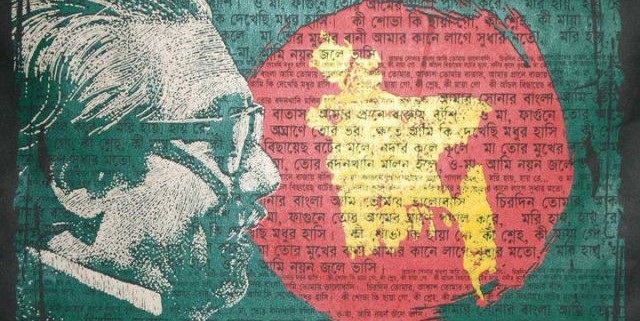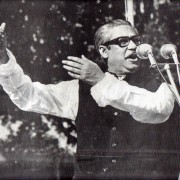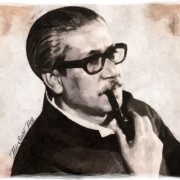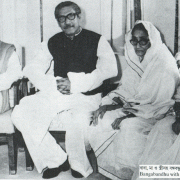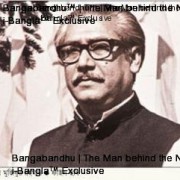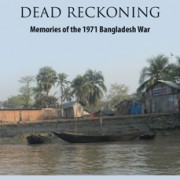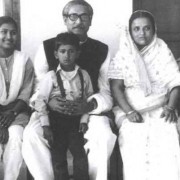Bangladesh Liberation 1971: Recalling United States and China’s Record
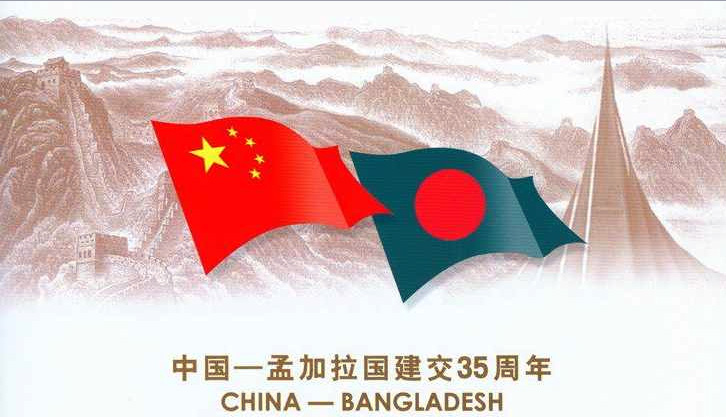 Bangladesh emerged as an independent nation in December 1971 after a horrendous ethnic genocide inflicted by the Pakistan Army beginning March 1971 on the Bengali East Pakistan even though the Pakistan Bengalis constituted Pakistan’s majority population.
Bangladesh emerged as an independent nation in December 1971 after a horrendous ethnic genocide inflicted by the Pakistan Army beginning March 1971 on the Bengali East Pakistan even though the Pakistan Bengalis constituted Pakistan’s majority population.
The genocide was vicious and brutal leading to the slaughter of nearly a million Bangladeshis. It was meant to stifle the Bangladeshi demands for independence.
The Pakistan Army genocide onslaught on Bengali East Pakistan was launched to nullify the General Elections results which would have swept the Awami League of Sheikh Mijibur Rahman into power in Pakistan. The Pakistan Army had the tacit support of Pakistani prominent leaders like Zulfiqar Bhutto.
Bangladesh emerged as an independent nation soaked in blood and violence. The Pakistan Army can be said to have virtually wiped out a generation of the best intellectual brains of Bangladesh.
The whole of 2013 has witnessed Bangladesh engulfed in a series of externally funded or inspired violent demonstrations operating with dual political objectives.
The first objective was to pre-empt or prevent the International Crimes Tribunal War Crimes trials of Bangladeshis who collaborated with the Pakistan Army in its genocide against Bangladeshis who happened to be their fellow citizens and co-religionists. These Bangladeshi collaborators of the Pakistan Army genocide were predominantly of the Jamaat-i-Islami. The first execution has taken place and some more are awaited.
Bangladesh’s present ruling Awami Party cannot be faulted for exorcising the Bangladeshi psyche of the ghosts of its genocide and cleansing the political ethos if violence which still persists. Bangladesh’s Generation Next has widely welcomed and supported these moves of the Government.
The second political objective operating in Bangladesh is to somehow prevent or discredit the January5 2014 General Elections ordered and being considered as per the existing Constitution. Spearheading incessantly this unending disruptive strikes and violence is the main Opposition Party, the BNP, which presumably feels politically toothless by its main coalition partner the Jammat-i-Islami being debarred by the Supreme Court from contesting elections. Jammat-i-Islami the largest Islamist party in Bangladesh
In essence what Bangladesh is witnessing today are some shades of the Liberation War 1971, Then it was a violent war being fought for liberation and independence. Today it is a political war with more violence than dialogue as Bangladesh’s Generation Next aspires that the ruling Government goes firmly ahead with exorcising the ghosts of Liberation War 1971. Then too the Islamist parties were on the wrong side of history and now too they are on the wrong side of history.
Contextually, it is curious and surprising that the United States and China as two major countries calling for ‘all inclusive’ General Elections are overlooking the fact that the main Opposition Party, the BNP has obdurately dug in its heels to ensure that General Elections as scheduled are not held or even if held as per the Constitution, then the outcome stands discredited. The ostensible demand being made is for a caretaker government when that provision in response to a Supreme Court ruling was constitutionally amended.
It is open to question as to why the United States with flurry of US officials visits to Dhaka and China with its ‘friendly’ advice have not been able to prevail over the BNP not to boycott the Elections. Is there some sub-surface geo-political game going on by these two?
At this crucial juncture, it would be appropriate to recall the United States and China’s record in the Bangladesh Liberation War 1971.
United States Sordid Record of Permissiveness in Pakistan Army’s Genocide in Pakistan
The United States dislike of the Awami Party stems from its role in the creation of Bangladesh. The United States record was rather ignoble and permissive of the Pakistan Army genocide of 1971.
Even today enough media reports are available suggesting that the United States perceptionaly desires that a BNP-Jamaat-i-Islami coalition should emerge as the new Bangladesh Government. So much so that reports indicate that one of the reasons for the current US-India stand-off is the widely differing political perceptions on Bangladesh.
Coming back to the sordid record of the United States in the 1971 Liberation War, I would like to quote a few excerpts from a brilliant book that has come out “The Blood Telegram” by Gary J Bass. It details the open revolt by the US Consulate in Dacca in 1971 headed by Archer Blood. Their despatches reflect the US sordid record in not restraining the Pakistan President and the Pakistan Army from ghastly atrocities being observed by the US Consulate officials and being reflected to Washington.
Read these damning excerpts from this book:
“The cable ( Blood Telegram to the State Department0 – the most radical rejection of US policies by its diplomats- blasted the United States for silence in the face of atrocities, for not denouncing the quashing of democracy, for showing ‘moral bankruptcy’ in the face of what they called ethnic genocide”
“As its most important international backer, the United States had great influence over Pakistan. But at almost every turning point in the crisis Nixon and Kissinger failed to use that leverage to avert disaster. Before the shooting started, they consciously decided not to warn the Pakistan’s military against using violence against their own people”
Nixon and Kissinger, always sympathetic to the Pakistan junta, were not about to condemn it while it was making itself so useful ( in opening a secret link to the Chinese leadership for the Americans ). So the Bengalis became collateral damage for realigning the global balance of power.”
“But Americans have been able to forget the legacy of 1971, the peoples of the sub-continent have not. The atrocities remain Bangladesh’s defining national trauma leaving enduring scars on the country’s politics and economy.”
The United States today has a lot to atone for and the least recompense is not to interfere in the internal political dynamics of Bangladesh. Their emphasis should not be on an ‘all-inclusive election’ but should have laid emphasis on ‘General Ejections be conducted strictly as per the Constitution’.
The emphasis on ‘all-inclusive elections’ is pressurising the present Government to yield to the BNP blackmail and thereby bring their preferred BN into the reckoning again.
China Opposed to Bangladesh’s Creation and was Complicit with the United States
China could not reconcile to the dismemberment of Pakistan and creation of the nation-state of Bangladesh. In this direction China twice used its veto powers to prevent the admission of the Bangladesh in the United Nations.
In the book quoted above it transpires that the United States in a bid to forestall the creation of Bangladesh prevailed on China to move Chinese troops to the India-Tibet border so that the Momentum of Indian Army and Mukti Bahini offensives racing for the fall of Dacca could be stalled. China did so and even issued ultimatums to India on specious grounds.
Fortunately both the United States and China could not reverse the tide of history and the Bangladeshi upsurge for liberation from the Pakistani brutal and suppressive yoke.
Chinese call today for all-inclusive elections is laughable when in China itself there is no democracy or inclusive political functioning. The Chinese ethnic and religious genocide in China Occupied Tibet is in no way less than the Pakistan Army genocide in Bangladesh in 1971.
In conclusion, at this critical juncture when Bangladesh Government and its Generation Next is engaged in exorcising the ghosts of its Liberation War1971 through the War Crimes Trials, they must remember the words of the Founding Father of Bangladesh, Sheikh Mujibur Rahman, who declared famously that: “ I have given you independence, now go and preserve it.
Bangladesh should never again allow itself to become “Collateral Damage” in any future geopolitical games.
Paper No. 5625 Dated 27-Dec-2013
By Dr. Subhash Kapila

